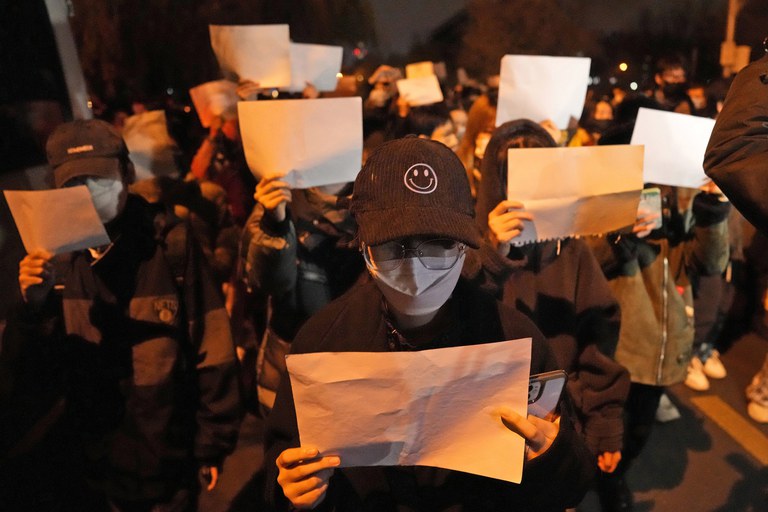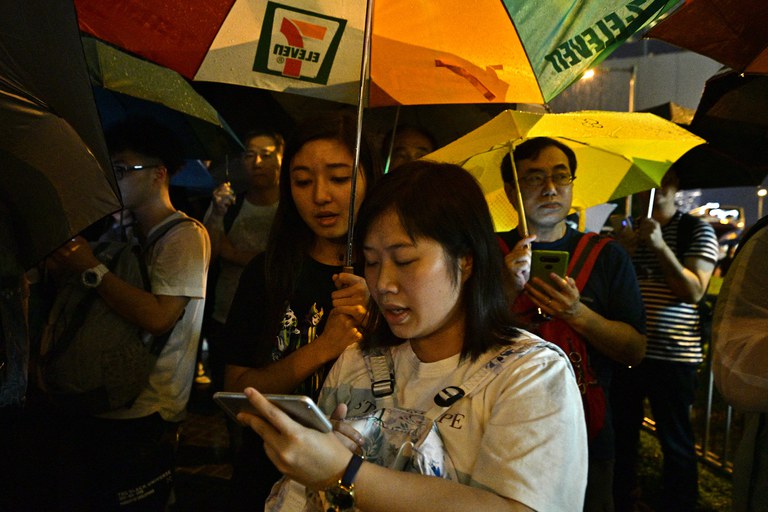The principle of nonviolence is rooted in the idea that justice can only be achieved through just means. Since Mahatma Gandhi founded his nonviolent resistance movement that eventually won India her independence, the idea has become accepted around the world, and the United Nations has designated Oct. 2 “International Nonviolence Day.”
The nonviolent resistance theory of the late American scholar Gene Sharp, a lifelong advocate for this form of resistance, has been credited with inspiring color revolutions in former Soviet bloc countries, the Jasmine Revolution in Tunisia, and the Arab Spring.
Nonviolent resistance is also emerging as the fundamental mode of protest against authoritarian rule for Chinese citizens, and sthe one that has the most impact.
From the fearless action of Peng Lifa on Beijing’s Sitong Bridge in October 2022, to Nanjing University of Media and Communications student Li Kangmeng, who was the first to silently raise a blank sheet of A4, kicking off the “white paper” protests that were to spread across China and make global headlines a few weeks later, there are plenty of examples.
In my view, nonviolent resistance isn’t just the main practical way to oppose authoritarian states today. It also holds significant implications for China’s future ability to achieve a peaceful political transition and establish a democratic government. We need to uphold this fundamental concept.

It’s a practical, feasible approach that ordinary people can incorporate into their daily lives. Its various forms, 198 of which were set out by Gene Sharp, are easily adopted, applied, and disseminated by the general public, making it unpredictable, and hard for authoritarian regimes to counter preemptively.
And it’s gaining traction among the people.
The goal in engaging in such tactics today is to end the totalitarian rule of the Chinese Communist Party and secure human rights and civil liberties for China’s people. To achieve this, we must build unity among various civil forces.
Nonviolent resistance is our only option today, not just because we lack firearms or because it aligns with our moral principles, but because it’s a necessity for the future – for pushing ahead towards a constitutional democracy, and eventually achieving democracy through peaceful means.
Because the collapse of authoritarian tyranny doesn’t automatically lead to constitutional democracy. Following the collapse of any authoritarian regime, there is the daunting task of clearing away the rubble and constructing a new political community, something that may prove much harder than overthrowing totalitarian rule in the first place.
When China enters its post-Chinese Communist Party era, people from different regions and ethnicities will have diverse ideas and demands. The complexity of addressing these contradictions and disputes may well surpass that of any other country in the world. Peaceful, rational communication, negotiation, and cooperation will become urgently necessary.
Violence could emerge
Commitment to nonviolent resistance means that we must consider our interests, but also those of our children and future generations to come, and we must continue to adhere to the principle of nonviolence throughout the whole process: in standing up to the tyranny of an authoritarian government today, but also in opposing the tyranny of the majority and protecting everyone’s human rights and civil liberties tomorrow.
Only then can we lay a solid foundation on which to build our future democracy, and prevent our progress towards democracy from being interrupted by a series of crises, as it was a century ago.
What’s more, violence may emerge at any stage of China’s political transition, and we must prepare to deal with it.
Plenty of those killed by the Chinese Communist Party, including Lin Zhao, Yu Luoke, Liu Xiaobo, and the students on Tiananmen Square in 1989, didn’t engage in violence, yet they still lost their lives at the hands of the authoritarian regime.
So we know that we’re facing an authoritarian regime that has no regard for the basic principles of humanity and no moral boundaries. Yet nonviolent resistance doesn’t mean people can’t defend themselves when the sword of authoritarian tyranny is raised against them.
Under such circumstances, keeping to the path of nonviolent resistance becomes even more challenging, requiring unwavering conviction, courage, wisdom, and long-term resilience.
We need to unite more people in this effort, because violence may be part of the reality of China’s political transition. Many in China and overseas worry about potential chaos in China if Communist Party rule were to suddenly collapse, leaving a power vacuum and societal breakdown.

In such a scenario, Chinese refugees might overwhelm neighboring Asian countries or even Europe and America, disrupting global peace and stability.
Back home, long-suppressed hatred could erupt into acts of violence.
Such fears are not unreasonable. China lacks a universally respected leader, a law-abiding culture, or any kind of guiding force transcending the political realm.
But that risk doesn’t justify continued authoritarian rule in any way.
On the contrary, it underscores the need for us to oppose violence and use the power of the law to hold criminal elements of the authoritarian regime to account for their crimes against the people, to ensure justice is done.
Complex and arduous transition
To achieve this, we will need to work together to maintain normal economic and social life, minimize acts of violence, reduce social unrest, and lessen the social cost of China’s political transition.
Only then can we gain genuine support from the international community and help the Chinese people to achieve effective political change.
Later, there may also be dissenting opinions and conflicts among the various forces that previously united against authoritarian rule. We must respond to this in a reasonable manner, and engage in democratic negotiations using nonviolent principles at all times, and never resort to violence to resolve disputes.
We will all need to better ourselves, if we’re to do this. China’s political transition will be complex and arduous, and will demand a high level of cultural literacy.
The process of political transition is also one of self-education, self-reflection, and self-improvement.
Above all, we must guard against falling into authoritarian thinking as a way to counter authoritarianism.
Chinese people have been steeped in authoritarian ideology from kindergarten to university, and every one of us has been marked by this kind of thinking.
Anyone advocating nonviolent resistance, anyone who aspires to freedom, democracy, and constitutional governance, must first purge themselves of the “wolf’s milk” they were raised on.
That includes, but isn’t limited to extremist forms of thinking, a belief in our own infallibility, insistence on ideological uniformity, intolerance of dissenting opinions, a zero-sum mentality, a black-and-white worldview and a general willingness to employ any means necessary to achieve our goals.

From an early age, the Chinese Communist Party has poisoned our hearts with hatred, which can make individuals exceptionally ruthless, hindering the development of kindness, empathy, and compassion, making them cruel and inhumane.
Once hatred takes hold, individuals become quick to anger and hostile, resorting to foul language, verbal abuse and personal attacks against those with differing opinions, something we often see on social media platforms.
Many people have also been influenced by the Chinese Communist Party’s insistence on “unity,” which could prove challenging as we try in future to deal rationally and peacefully with the diverse wishes, cultural traditions, religious beliefs and regional interests of different ethnic groups and populations in China.
Only by consciously rejecting the ideology of “unity,” and respecting and protecting the rights of every individual, particularly the right to choose one’s fate freely, can we avoid imposing our own desires on others and prevent the authoritarian regime from using us to harm different [non-Han Chinese] ethnic groups.
We must expose their crimes and lies, perpetrated under the guise of “safeguarding national unity.”
We must broaden our horizons and embrace any valuable ideas, knowledge, and theories that will further China’s political transition. We need to join forces with like-minded individuals, while also learning to compromise, accept and include.
Only then can we pave the way for a brighter future where democracy is firmly established, and the lessons of the past are not forgotten.
Translated by Luisetta Mudie.
Cai Xia, a retired professor of the Central Party School of the Chinese Communist Party, was expelled from the party and had her pension stripped in August 2020 for “serious violations of political discipline” following her criticism of the increasingly authoritarian policies of Xi Jinping, party chief and state president. She is currently based in the United States. The views expressed here are Cai’s own and do not reflect the position of Radio Free Asia.

